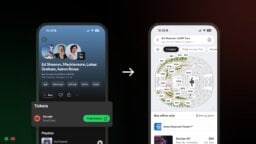Spotify has been granted a flurry of US patents in recent months.
MBW discovered in September, for example, that the platform had been granted a patent for a new karaoke-like feature that allows users to “overlay a music track with their own vocals”.
And last week, we told you about a new Spotify patent that suggests the company is working on geo-targeted advertising, using 3D audio.
Today, MBW’s gotten hold of a new Spotify patent. It may well prove to be transformational for the platform – but it’s also, and there’s really no other way to put this, really quite creepy.
Yesterday (October 6), Spotify was granted a US patent for “Methods and systems for personalizing user experience based on [user] personality traits.”
The patent application was initially filed in November 2018.
The filing, leaked to us by a source close to SPOT, and which you can read in full here, argues that “there is a need for systems and methods for personalizing media content in accordance with one or more personality traits associated with a user”. (Bolding MBW’s own.)
“it is possible to identify a personality trait of a user based on the content (e.g., music) the user consumes (e.g., listens to) and the context in which they consume the content.”
Spotify patent
Behavioural variables such as a user’s mood, their favourite genre of music, or their demographic can all “correspond to different personality traits of a user”, reads the patent.
“Thus, it is possible to identify a personality trait of a user based on the content (e.g., music) the user consumes (e.g., listens to) and the context in which they consume the content.”

Spotify claims that “before assigning a personality trait to the user, a personality model may be built”.
The patent clarifies that this “model” could identify users’ personality traits “based on a questionnaire, such as the Big Five Inventory (BFI-44) or the Meyers-Briggs personality survey“.
“The traits measured by the questionnaire may then be used as the possible personality traits that can be assigned to the user. [These] possible personality traits… include the Big Five personality traits: openness, conscientiousness, extraversion, agreeableness, and neuroticism.”
“possible [user] personality traits… include the Big Five: openness, conscientiousness, extraversion, agreeableness, and neuroticism.”
Spotify patent
Spotify suggests that, armed with this knowledge, it could then promote content – presumably audio advertising content, but also perhaps music and podcast content – to users based on the personality traits it has detected.
This is where things starts getting a little that-moment-when-things-turn-bad-in-sci-fi-movie.
“In some embodiments in which the personalized content includes one or more messages with audio components,” explains the patent, “the electronic device changes a tone of voice for messages for presentation to the user.”
It continues: “For example, the tone of voice may be more upbeat, high-pitched and/or exciting for users that have been assigned the personality trait of extroversion.
“The tone of voice may be quiet and/or soft-toned for users that have been assigned the personality trait of introversion. This modulation of tone helps to humanize the user interface for the media-providing service in accordance with the user’s personality, thereby improving the user experience.”
The science behind the filing is more than a little unnerving, too.
Several individuals named as inventors of Spotify’s patent – including Ian Anderson (A Senior Research Scientist at Spotify), Clay Gibson (Senior Machine Learning Engineer at Spotify), Scott Wolf (a Data Scientist at Spotify) – co-wrote a scientific research article published in July this year.
Entitled, “Just the Way You Are”: Linking Music Listening on Spotify and Personality, the article details a research project in which the authors analysed 17.6 million songs and over 662,000 hours of music listened to by 5,808 Spotify users in the United States over a three-month period.
“The Big Five personality traits are predicted by musical preferences and habitual listening behaviors with moderate to high accuracy.”
Linking Music Listening on Spotify and Personality, published July 2020
The summary of the article, which you can read here , explains: “Building on interactionist theories, we investigated the link between personality traits and music listening behavior, described by an extensive set of 211 mood, genre, demographic, and behavioral metrics.
“Findings from machine learning showed that the Big Five personality traits are predicted by musical preferences and habitual listening behaviors with moderate to high accuracy.”
The study was given ethical approval by the internal review board (IRB) at Spotify, according to the article.
Its authors conclude: “The present work is a model for how psychological methods can be fused with cutting-edge technology and big data for scientific inquiry.
“[The] results show that personality does in indeed play an important role in musical preferences and warrants continued rigorous investigation.”
What might this “continued rigorous investigation” comprise, exactly?
“Future research could begin to link streaming behavior with brain scanning, genetic, and physiological data.”
Linking Music Listening on Spotify and Personality, published July 2020
From the article: “Given the vast volume of research on the cognitive neuroscience of music and the emerging literature (Peretz & Zatorre, 2012) on the social neuroscience of music (e.g., the role of oxytocin) (Keeler et al., 2015), future research could begin to link streaming behavior with brain scanning, genetic, and physiological data.”
Cool.
(Oxytocin, if you weren’t aware, is a hormone secreted by the body’s pituitary gland. Coined the “love hormone”, it is typically released within humans when a couple are sharing a tactile moment – e.g. cuddling on a sofa – or during a strong social bonding moment.)
The Spotify article’s authors warn that “such future research and applications must be conducted within the strict boundaries of ethical data usage, collection, and storage policies”.
They add: “A user’s digital history is extraordinarily personal and sensitive and should be treated with proper consideration of the conceivable misuses and unintended externalities.”
We like reading that bit in our head in the voice of Dr. John Hammond, from Jurassic Park.
Last year, the journalist Liz Pelly wrote an article called “Big Mood Machine” in which she looked at Spotify’s existing mood-related data analysis for content recommendation as well as advertising purposes.
Pelly’s closing observations in that article serve as a profoundly relevant analysis of Spotify’s latest patent.
“We should admit that it’s good for business for Spotify to manipulate people’s emotions on the platform toward feelings of chillness, contentment, and happiness,” wrote Pelly.
“This has immense consequences for music, of course, but what does it mean for news and politics and culture at large, as the platform is set to play a bigger role in mediating all of the above, especially as its podcasting efforts grow?”Music Business Worldwide





